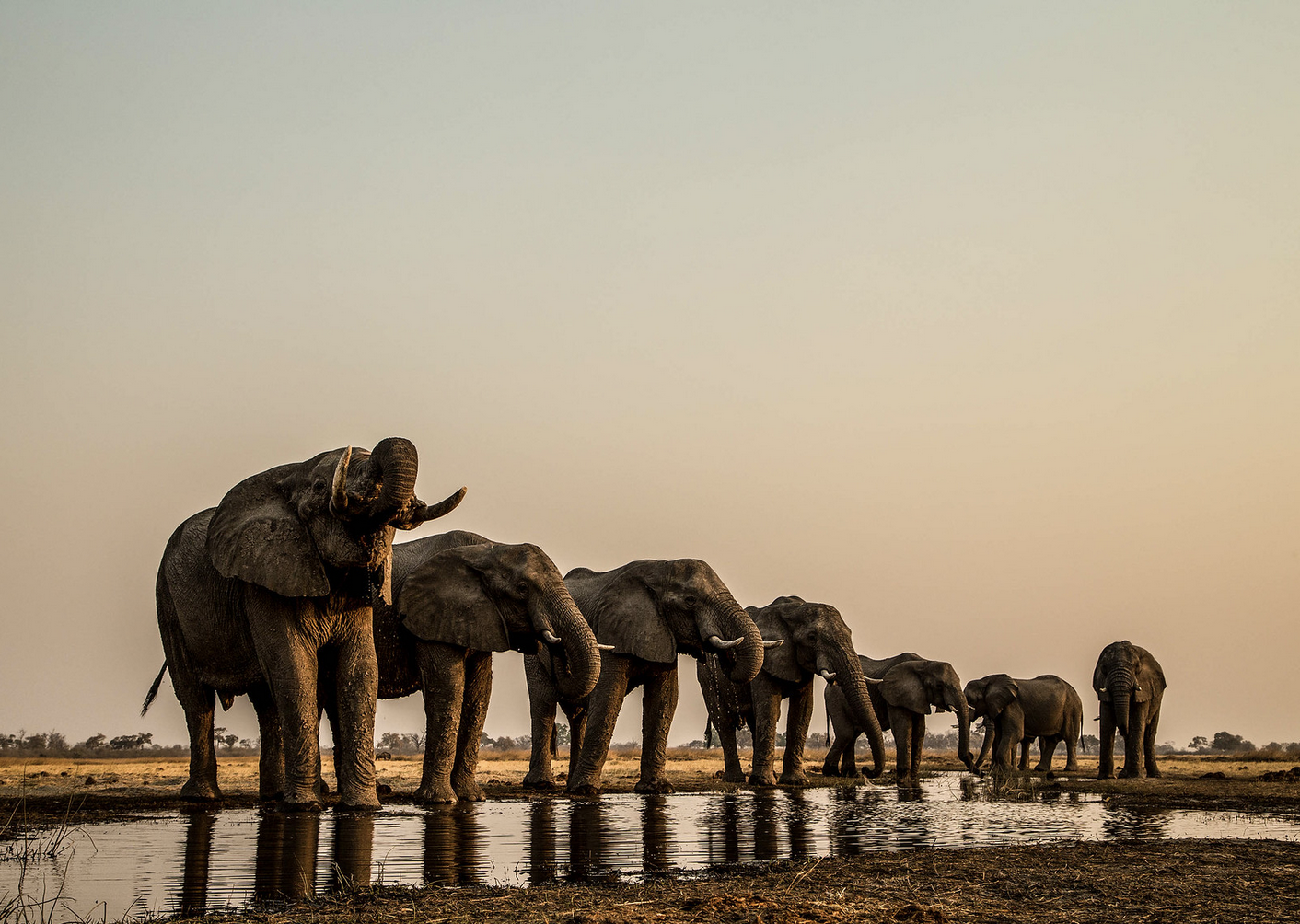
Dry desert wind stirs as weary bodies move like a mirage across the plains of Botswana, Africa. Here zebras, elephants and lions search the barren soil for the most sacred of elements which inexplicably binds them to each other. Water is the force that spurs this annual pilgrimage. These animals travel through Purgatory along their quest for Paradise, and ultimately find it in the form of a mother river. She ebbs and drifts inland from the highlands of Angola and into Botswana before vanishing into the Kalahari Desert. She bestows life as easily as she can take it away. Her name is the Okavango.
It is here in this opening scene of Okavango: River of Dreams that filmmakers Beverly and Dereck Joubert begin to lead us on their quest to discover the soul of this river, and the souls of those who inhabit it. We peer through the eyes of a wounded lioness, struggling to keep herself and her cubs alive. We feel the quake of an elephant’s footstep, as it shapes the direction of the meandering river. Through these moments, we begin to understand the symbiotic relationships amongst species. Relationships that take root and strengthen, like the trees that attach themselves to termite mounds and help stabilize islands. Like freshwater plankton that provide the foundation for entire underwater food webs. Okavango: River of Dreams, is not only a love letter to one of the most powerful rivers on the planet. It is a song of conservation and a call to action. To preserve one of the last remaining pristine ecosystems we have left.
The making of the film, has certainly proven to be a labor of love for the Jouberts. Having spent over 35 years filming in Botswana, the South African couple have dedicated their lives to research and conservation advocacy as explorers with National Geographic. From their first steps into the wilderness of Botswana, it was love at first sight. As Dereck puts it:
“Straight out of university we left to go to the real Africa. To understand the continent we were born on that was so desperately conflicted. And to understand the soil, the grass, the animals, our souls… everything about it. And we got lost in it.”
Often it is through losing ourselves that we are able to apprehend the fragility of these intricate ecosystems. And by losing ourselves, we discover the fragility of our own lives in connection to the lives around us. Without shying from the truth, the film delicately explores this hymn of life and death. A hymn that all creatures within the Okavango will begin to hear and understand, including the filmmakers themselves. During a nocturnal film session, both Beverly and Dereck were violently attacked by a bull cape buffalo. Beverly, who nearly lost her life three times from traumatic injuries, reflects back on those moments and the months after the accident as an “intense spiritual period.” She recalls:
“It was almost like a metamorphism of being reborn. In a way I never really knew how much I appreciated life and the desire to do so much for planet Earth that I had inside me until that moment. I think in that I discovered a new side of my soul, but also most importantly, the stronger bond and the soul connection that Dereck and I have and how incredibly connected and united it made us.”
This universal dance of life and death unites all living beings and is a central theme throughout the film. The animals in the Okavango Delta must depend on each other for survival as they navigate the river’s complex mosaic. Slowly the river weaves and enters a state of Limbo, before flowing freely again. Along this journey, the Jouberts pay incredibly close attention to each detail, from the beady eye of a crocodile as it watches its prey, to the glittering reflection of scavenger beetles flickering like diamonds along the water’s edge. All life here is considered sacred. As viewers we observe these intimacies as if we are peering through curtains into the private theaters of each character. And in this Divine Comedy, no role is more significant than another.
By capturing the wildlife in the Okavango, Beverly and Dereck have illustrated the very essence of why we must continue to fight to keep pristine wilderness alive. And why the species that find refuge in these sanctuaries are so critical for their survival.
“The more we eradicate wildlife out of these systems, the more sterile they become. We can’t have sterile systems. For us, a pristine place is not only vastly important for our souls, but it is the essence of what we breathe and what we need,” states Beverly.
Despite many successes that the Jouberts have seen regarding protection within the Okavango Delta, Dereck warns against becoming too complacent in the face of these victories. The Greater Okavango Basin, which includes critical lakes and rivers that supply the delta, is constantly being threatened by fire, deforestation, hunting, and overdevelopment. For the Jouberts, there is always work left to be done.
“Films like the Okavango will speak to everyone around the world. However, we can’t say enough to showing this film in Botswana or in Kenya or Zimbabwe,” says Dereck.
The Jouberts believe that by working collectively with governments and communities in Botswana and throughout Africa, that there can be protection of pristine wilderness and continuous support to local economies. By encouraging active stewardship and preservation of wilderness, jewels like the Okavango will continue to shine as beacons of hope in an often darkened world. The film’s quest to discover the soul of a wild river teaches us to understand her significance. It emboldens us to tell her story and the stories of others like her. And reminds us to seek the truth above all else.
